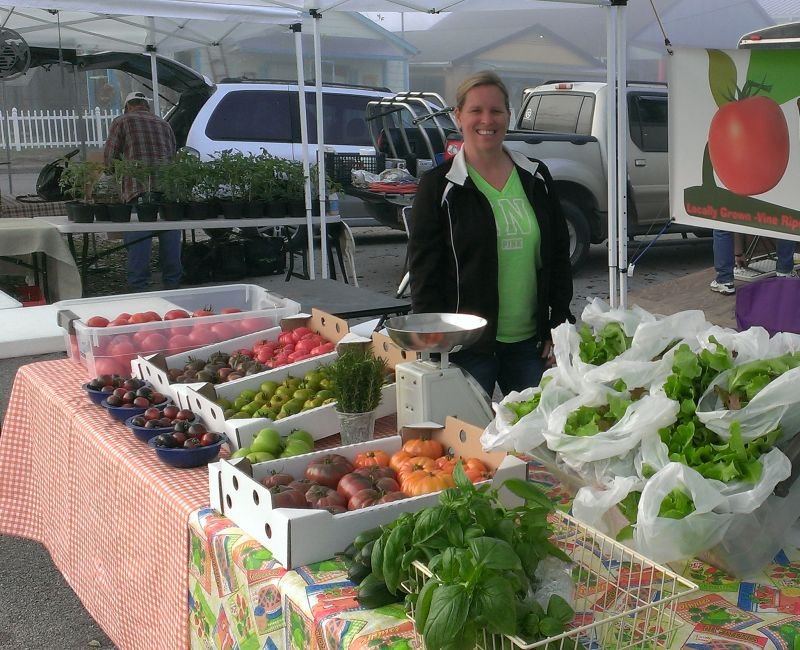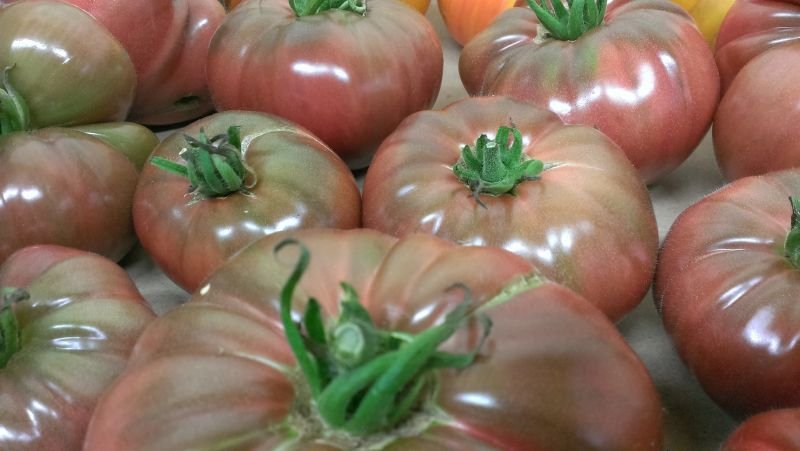I say this as a farmer speaking to you the consumer!
I have been farming for several years now. I know the joys of producing my own food, be it fresh vegetables or homegrown pork, chicken and beef, there is no comparison. I also realize that in our society today, not everyone can grow their own food. Guess what? There is a place you can get fresh locally grown food not produced at a factory farm, It's known as your local farmer's market!
Farmer's Markets provide an outlet to your local growers to move their product to the consumer. Not all markets are the same, some are simply flea markets with a few growers thrown in, while others don't have rules that mandate vendors grow their own produce. I have seen vendors trying to sell produce that they purchased from wholesale markets trying to sell at smaller markets, sometimes with the labels still on the product.
What Makes a Great Farmer's Market?

A great market will have the majority of it's vendors selling locally grown and made products, from vegetables to home canned items, grass fed meats, locally made cheese and honey, even home baked bread! There will also be a few crafters and artisans, but it is a farmer's market! Heck I go to markets that have locally made mead! You can get just about everything you could want!
What About Those High Prices?
Let's face it folks, you pay for quality! As with anything quality costs, You can order a hamburger at a fast food chain with unknown quality meat for $3.50 or you can go to a better restaurant and get a kobe beef burger and pay $20, you will certainly taste the difference.
Small scale farming is a costly affair, in both time and money, sure you can go to your local grocery store and get vegetables that were factory farmed and get cheap produce, or you can go to they guy who grew his tomatoes and ask him about his growing methods, or they guy that raised his grass fed beef and ask him if he really grows his beef on only grass or is it grain finished. Try asking the guy at the meat counter of your grocery store and see if he knows the answer. Yes you will pay a premium for fresh locally grown produce, but you will get a better product.
Educate Yourself Before You Go To A Farmer's Market!
That's right, get some info before you go. You don't have to know everything, but an informed consumer is a smart consumer.
I have been selling at Farmer's Markets going on five years now, and it is amazing to me the number of people who rely on Dr. Oz and Oprah to educate them on important things like what they eat.
At every market without fail I will get someone who asks me if I use GMO seeds, or they think hybrid varieties aren't safe. I had one lady pick up a cucumber and she got stuck by a spine. She was flabbergasted. I told her most cucumbers have spines, at grocery stores they are removed and the cucumber is sprayed with wax to keep it fresher longer. She then asked me If I waxed the cucumbers?! I just shook my head.
Ask Questions!
I certainly don't mind educating the buyer about my produce, in fact I love talking to people about it. Sometimes it's really busy and I don't have a chance to stop and talk at length. But here is some quick info on the topics I hear most people are concerned with.
GMO and Hybrid Vs Heirloom Varieties
In recent years the word Heirloom has been used a lot lately, nothing wrong with it, but what does it mean? Simply stated and heirloom variety of anything, tomato, pig, turkey you name it, is a plant or animal that has not been hybridized. What does that mean? Well without getting into a long science lesson, A hybrid is the crossing of two different phenotypes of a plant or animal. For example a Labradoodle is a hybrid of a Labrador Retriever and a Poodle. You are simply selecting traits from tow different types of dogs and getting a third type of dog. Same work for the plant kingdom.
In my case I use a Tomato that has been hybridized to grow faster and produce more fruit in a greenhouse setting, it was made by hand pollinating two different types of tomato and harvesting the seeds from the mature tomato to grow the hybrid plant. No magic, no gene manipulation other than natural pollination. GMO's plants on the other hand have had their genetic code changed at the cellular level to express certain traits, usually pest resistance or ripening characteristics. This example would be like taking the genetic code from a bacteria that is harful to certain bugs, but not humans, and putting it into corn plants so they have resistance to the bug. Is it wrong or dangerous, I'll let you decide that.
For a more detailed look into GMO's check @justtryme90 's post.
/@justtryme90/science-lesson-genetically-modified-organisms-how-are-gmos-created
Back to heirlooms, heirloom varieties are genetically untouched varieties, they have not been hybridized and remain true to type, meaning if you mate two Large Black Hogs you will get more large black hogs. Their genetic code has been stabilized thru years of breeding the same type of hogs. The same goes for tomatoes, with one of the best known heirloom variety being the Cherokee Purple. If you collect seeds from a Cherokee Purple you will grow a Cherokee Purple Tomato.

So which type is better? Well honestly, all these methods are of more concern to the grower than the buyer. Now I know everyone is up in arms about GMO, and I agree, I'm not sure of the long term effects of GMO's so I won't use them. As far as Hybrids and Heirlooms varieties, I grow both. The heirloom varieties don't grow as fast or produce as much, but people still want them.
Organic Vs Conventional Growing
This is a biggie, people always ask if we are organic, technically we are not. But we use organic methods. Just make sure you ask the questions and not just rely on the Label.
The Organic label has been a bit of contention with me, after seeing all the regulations that cover organic growing, I find that it is misleading. Consumers think that organic means cleaner, safer, better. But if you look into the regulations, In the US at least, you will find some loopholes.
Pesticides: Certain Pesticides are allowed in Organic Growing!
Read that again!
Yes you read it correctly. Don't just rely on Organic as the end all be all of your purchasing. Now I will say this, the pesticides allowed are supposed to be "less harmful" but they will kill bugs? Is it better than conventional growing, probably, I'm just saying be informed.
Thanks, and support your local farmer!
